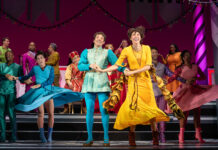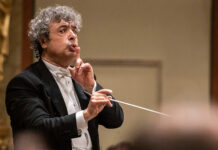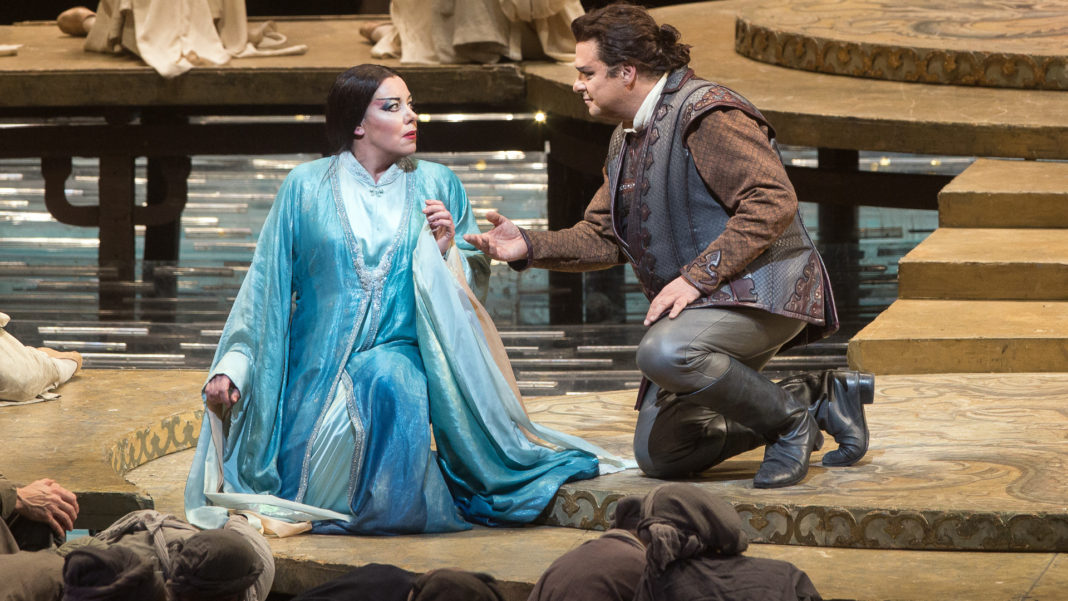What does Week 28 at the Met have in common with the programming that makes up Week 70 at the Met? Both celebrate the work of Giacomo Puccini.
Since he composed 12 operas, it is inevitable that there will be some operas being presented in both weeks. In fact, the same seven operas are being presented this week that were presented back in September. However, to the Met’s credit, there is only one production being shown this week that appeared in the previous Puccini Week.
Amongst the stars in this week’s operas are Roberto Alagna, Barbara Daniels, Plácido Domingo, Angela Gheorghiu, Karita Mattila, Luciano Pavarotti, Renata Scotto, Nina Stemme, Paulo Szot and Shirley Verrett.
All productions become available at 7:30 PM EST/4:30 PM PST and remain available for 23 hours. Schedules and timings may be subject to change.
The Met is heavily promoting their Met Stars Live in Concert series and the planned resumption of performances in the 2021-2022 season, so you’ll have to go past those announcements and promos to find the streaming productions on the Metropolitan Opera website.
If you read this column early enough on July 12th, you’ll still have time to see the 2016-2017 season production of Strauss’ Der Rosenkavalier that concludes Richard Strauss week.
Here is the full line-up for Week 70 at the Met:
Monday, July 12 – Puccini’s Manon Lescaut – 2nd Showing
Conducted by James Levine; starring Karita Mattila, Marcello Giordani and Dwayne Croft. This revival of Gian Carlo Menotti’s 1980 production is from the 2007-2008 season.
Puccini’s Manon Lescaut was based on Abbé Prévost’s 1731 novel, Histoire du Chevalier des Grieux, et de Manon Lescaut. The libretto is by Luigi Illica, Marco Praga and Domenico Oliva. Manon Lescaut had its world premiere in Turin in 1893.
This is another opera about an ill-fated couple. Manon is taken by her brother to live in a convent. A local student, Des Grieux, feels it is love at first sight and persuades Manon to run away with him. Poverty doesn’t suit her, nor does a life of having everything she wants when she leaves Des Grieux for Geronte, the man her brother had chosen as a possible husband. Passion cannot be denied, but doesn’t mean Manon and Des Grieux will live happily ever after.
Anthony Tommasini said in his New York Times review that there was basically one reason the Met brought back this production of Manon Lescaut after 18 years: Mattila. He said she did not disappoint. Going further he added, “Though a lovely and mature Finnish woman, Ms. Mattila is such a compelling actress that she affectingly conveyed Manon’s girlish awkwardness. She acted with her voice as well, singing with burnished sound and nuanced expressivity.”
Tuesday, July 13 – Puccini’s La Bohème – 3rd Showing
Conducted by James Levine; starring Renata Scotto, Maralin Niska, Luciano Pavarotti, Ingvar Wixell and Paul Plishka. This Fabrizio Melano production is from the 1976-1977 season.
Easily one of the most popular operas in the world, Giacomo Puccini’s La Bohème had its world premiere in Turin, Italy in 1896. The libretto is by Luigi Illica and Giuseppe Giacosa. The opera is based on Henri Murger’s 1851 novel, Scènes de la vie de bohème.
The story centers on four friends who are unable to pay their rent. Successfully getting out of a potentially bad situation with their landlord, all but one go out on the town. Rodolfo stays home and meets a young woman named Mimi. They fall in love, but Mimi’s weakness may be a sign of something far more life-threatening than they know. (If this sounds like the musical Rent, it is because La Bohème served as Jonathan Larson’s inspiration for that musical.)
Pavarotti made his Met Opera debut in 1968 in La Bohème. This 1977 production of Puccini’s beloved opera was actually the very first Live at the Met broadcast.
Harold C. Schonberg, writing in the New York Times, said of Pavarotti’s performance, “Nobody around today can sing a better Rodolfo, and this despite the fact that the voice has changed somewhat in recent years. It is a little heavier passages above the staff are not produced as effortlessly as before sometimes there is a decided feeling of strain. One hopes that the Manricos he has been singing have not taken the lyric bloom from his voice. With all that, he sang most beautifully last night. Only Mr. Pavarotti can spin out long phrases with such authority and color.”
Wednesday, July 14 – Puccini’s Tosca – 4th Showing
Conducted by James Conlon; starring Shirley Verrett, Luciano Pavarotti and Cornell MacNeil. This Tito Gobbi production is from the 1978-1979 season.
It is quite likely that Puccini’s Tosca was the first opera to premiere in 1900. Its first performance was on January 14 in Rome. Based on Victorien Sardou’s 1887 play of the same name, Tosca‘s libretto was written by Luigi Illica and Giuseppe Giacosa.
The setting for Tosca is Rome in 1800. The Napoleonic wars were raging and political unrest was omnipresent. The opera takes place over the course of slightly less than 24 hours. Floria Tosca is the object of Chief of Police Baron Scarpia’s lust. He uses suspicions that her lover, Mario Cavaradossi, aided a political prisoner who has escaped as an opportunity to get him out of his way which will leave Tosca for himself. After capturing Cavaradossi, Scarpia says that if Tosca doesn’t become his lover, he will have Cavaradossi killed.
Donal Henahan, in his New York Times review, praised Verrett’s singing. “Miss Verrett, in appearance the most persuasively starlike Floria Tosca the Met has offered in years, also succeeded in satisfying the purely vocal demands of her role. There was little strain anywhere, and many passages of extraordinarily fine, intelligently nuanced singing.”
He went on to say about Pavarotti, “Mr. Pavarotti, though a bit thin of voice in such outpourings as ‘Recondite armonia,’ pitched himself into the action, vocally and theatrically, with his usual infectious enthusiasm. Puccini is notoriously hard on voices—perhaps more so than Verdi or even Wagner— and Mr. Pavarotti is taking a calculated risk in moving into emotionally heavy and tone‐shredding roles. But his ‘Vittoria!’ rang out excitingly, without sounding strident, and in the lyrical passages he was nothing less than glorious. Bravissimo is not good enough for such singing. How about pavarotissimo?”
Thursday, July 15 – Puccini’s Madama Butterfly – 2nd Showing
Conducted by Pier Giorgio Morandi; starring Hui He, Elizabeth DeShong, Bruce Sledge and Paulo Szot. This is a revival of the 2006 Anthony Minghella production from the 2019-2020 season.
Puccini’s Madama Butterfly is every bit as popular as La Bohéme. Luigi Illica and Giuseppe Giacosa wrote the libretto based on John Luther Long’s short story, Madame Butterfly and on the 1887 French novel Madame Chrysanthème by Pierre Loti. David Belasco turned Long’s story into the play Madame Butterfly: A Tragedy in Japan. Puccini saw the play in 1900 in London. His opera had its world premiere in 1904 at La Scala in Milan.
Cio-Cio San falls in love with an Lieutenant in the U.S. Navy named Pinkerton while he is stationed in Japan. They hold a wedding ceremony that Cio-Cio San takes very seriously. When Pinkerton has orders to go back to the States, she awaits his return. Unbeknownst to Pinkerton, Cio-Cio San has gotten pregnant and given birth to a son. When he finally does return with his American wife, Cio-Cio San is devastated. (If this sounds like the musical Miss Saigon, it is because Madama Butterflyserved as the inspiration for that musical.)
Seth Colter Walls, writing in the New York Times, praised much of Hui He’s work as Cio-Cio San:
“Ms. He’s work in ensembles could also give off a stranded feeling — and not just because of the strain evident in ascents to high notes. Yet during more intimate passages, she pulled the night together by delivering a Cio-Cio-San full of subtle yet fascinating changes. Some darkly rich tones provided dramatic dimension for her first-act work before a brighter, brassier sound underlined the character’s hopeful delusions in the second act. Tellingly, the soprano was at her most moving when interacting with her young son, depicted in this production through Bunraku-style puppetry. In these moments, the intensity that was missing from the flesh-and-blood interactions became plainly obvious.”
Friday, July 16 – Puccini’s La Fanciulla del West FIRST SHOWING
Conducted by Leonard Slatkin; starring Barbara Daniels, Plácido Domingo and Sherrill Milnes. This Giancarlo Del Monaco production is from the 1991-1992 season.
Giacomo Puccini’s La Fanciulla del West had its world premiere at the Metropolitan Opera in 1910. It was Puccini’s follow-up to Madama Butterfly. Like that work, this was also inspired by a play by David Belasco. The Girl of the Golden West was adapted by Guelfo Civinini and Carlo Zangarini.
Set during the Gold Rush era in California, Sherriff Rance is told by a Wells Fargo agent, Ashby, that he is chasing a bandit named Ramerrez. Minnie is the owner of the bar where Rance’s unrequited love for Minnie remains just that. A stranger arrives and successfully flirts with Minnie. He identifies himself as Johnson, but in reality he is the bandit Ramerrez. Can he avoid recognition and capture? Will their love save the day?
Martin Bernheimer, writing in the Los Angeles Times, was very impressed with the production. Here are excerpts from his review:
“The Metropolitan Opera has expended rousing, loving care on its new production of La Fanciulla del West…The most striking contribution to this emphatically successful project would seem to come, however, from the stage director: Giancarlo del Monaco…His Fanciulla may be the most realistic, the most detailed, the most atmospheric version since the world premiere, which happened to be presented by the same company 81 years ago…Perhaps Del Monaco has given us the ultimate oxymoron: a thinking person’s Fanciulla del West.”
Saturday, July 17 – Puccini’s La Rondine – 4th Showing
Conducted by Marco Armiliato; starring Angela Gheorghiu, Lisette Oropesa, Roberto Alagna, Marius Brenciu and Samuel Ramey. This Nicholas Joël production is from the 2008-2009 season.
Puccini’s La Rondine had its world premiere in Monaco in 1917. The libretto, based on a libretto by Alfred Maria Willner and Heinz Reichert, was written by Giuseppe Adami.
Multiple people collide in this opera about love. Magda is Rombaldo’s kept mistress. While entertaining friends, including the poet Prunier, she realizes how much she misses being in love. Prunier is in love with Lisette, who is Magda’s maid. A young man enters their group, Ruggero, who falls in love with Magda. Could he possibly provide the true love she so desperately desires? Who will end with whom and will they all live happily ever after?
Gheorghiu and Alagna were the hottest couple in opera when this production happened. They first met in 1992 while performing in La Bohème together. They were married four years later while also doing a production of the same opera. In late 2009 they separated. They reconciled two months later, but did end up divorcing in 2013.
But the chemistry was still very much alive in this production. Anthony Tomassini wrote in the New York Times:
“…in this sensitive staging, thanks to the expressive performances of Ms. Gheorghiu and Mr. Alagna, this excess of Italianate emotion just makes “La Rondine” more appealing.”
Sunday, July 18 – Puccini’s Turandot – 2nd Showing
Conducted by Paolo Carignani; starring Nina Stemme, Anita Hartig, Marco Berti and Alexander Tsymbalyuk. This revival of Franco Zeffirelli’s 1987 production is from the 2015-2016 season.
Puccini’s opera had its world premiere in 1926 in Milan. The libretto was written by Guiseppe Adami and Renato Simoni. The composer died two years before its premiere and the opera was completed by Franco Alfani.
Set in China, Turandot tells the story of Prince Calaf who has fallen in love with the title princess. She, however, isn’t very interested in him. In order for any man to marry Turandot, he is required to correctly answer three riddles. Should any answer be wrong, the suitor is put to death. Calaf is successful, but Turandot remains opposed to their marriage. He strikes a deal with her that will either lead to their marriage or his death.
By the time this production of Turandot was broadcast on Met Opera in HD, Nina Stemme was the fourth woman to sing the title role. Christine Goerke, Lise Lindstrom and Jennifer Wilson had all performed in the production prior to Stemme. It should be noted that having multiple singers for a given role during a season is not at all unusual.
Vivien Schweitzer, in her review for the New York Times, said of Stemme’s performance that she, “managed to render the grisly ice maiden surprisingly vulnerable. Ms. Stemme sounded more grief-stricken than angry during “In questa reggia,” the aria in which she recalls her violated ancestor.
“Her powerful, luxuriant voice retained its warmth throughout the evening, with blazing high notes that were never forced or shrill, even when projected over the massed ensembles of orchestra and chorus. Her transition from powerful to helpless seemed particularly acute when she begged her father not to be given to the “stranger” (the prince Calaf), who has solved the riddles that will allow him to possess her.”
That’s the line-up for Week 70 at the Met. For those following the labor issues at the Metropolitan Opera, a tentative agreement has been reached so it looks like there will indeed be a 2021-2022 season. That will mean more LIVE in HD presentations to experience.
Enjoy your week! Enjoy the operas!
Photo: Nina Stemme and Marco Berti Puccini’s Turandot. (Photo by Marty Sohl/Courtesy Metropolitan Opera)










